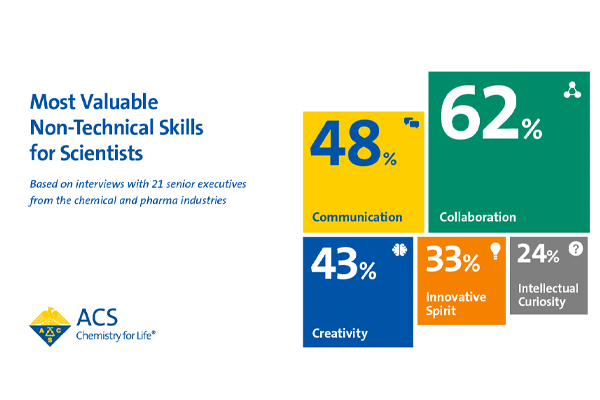Katherine L. Lee, Senior Director, Head of Scientific Planning and Operations, Inflammation and Immunology Research Unit, Pfizer: [00:00:00] Presuming that we all have strong technical skills, the non-technical skills that I think are super important are both written and oral communication because a lot of our job is communicating what we've done, asking for help from other members of our team or our supervisors, and basically sharing and working together and solving problems together.
[In academia] I think there's a little bit more of a me, me, me, these are my results, this is my project. I'd say that for a job in industry, it's a lot more team focused, which can be a little bit of an adjustment. So like I said, asking for help from others, giving credit to others, and really working together to solve problems would be the third thing that I bring up.
Bill Carroll, Carroll Applied Science, L.L.C.: [00:01:03] You can get all the results you want, but if you can't explain them to someone, it's as though you didn't have them at all. I discovered something else. The first time I ran for ACS President a million years ago, the Journal of Chemical Education asked us each to write a statement about education.
I thought, "I come from industry, what do I know about education?" But then I thought about all the things that I had done in industry, whether it was sales or customer service or lobbying or making presentations to senior management and all of those things involved explaining technical things to people who didn't have the same kind of technical background.
Well, you know, we got a name for that. That name is teacher. And so what you discover is that no matter what you do, as Chris said, no matter what you do, you're going to be teaching. Now the one other thing I'll throw in is to learn how to network.
And that's not just in order to advance your career to get another job, but it's in order to get things done in your company, whether it's a small company or a large company.
Christina Bodurow, Vice President, Global Regulatory Affairs, Data Sciences, Safety & Regulatory, IQVIA: [00:02:12] The only thing I might be able to add is something that for those of you guys who read my "What I Learned" piece earlier this summer, it's being able to very quickly discern the goals of your workgroup, of your project, and getting yourself aligned with those as quickly as possible.
And it sounds easy, but sometimes it takes a while. And you do have to talk to not only your boss, but everybody on your team, maybe some of the folks that are one or two steps removed from your team. You really need to think hard about how you're going to formulate your own work plan to make sure that you are pointing in the same direction.





